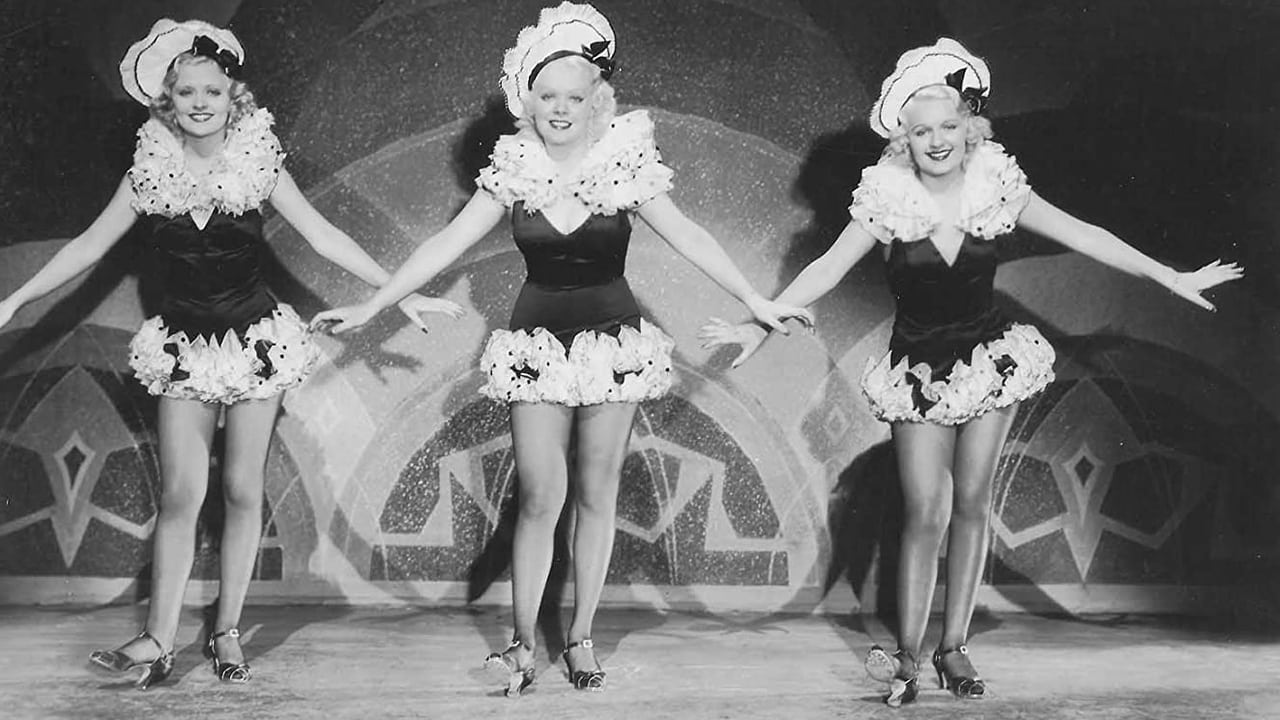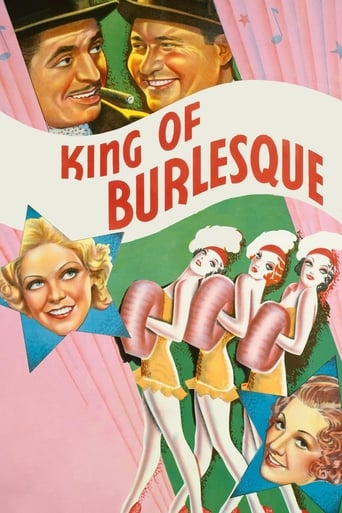



Disappointment for a huge fan!
Clever and entertaining enough to recommend even to members of the 1%
View MoreAll of these films share one commonality, that being a kind of emotional center that humanizes a cast of monsters.
View MoreIt is interesting even when nothing much happens, which is for most of its 3-hour running time. Read full review
View MoreIt's interesting how different roles played by the same actor can form a continuum. The master showman played by Warner Baxter here in 'King of Burlesque' could arguably be the same master showman played by Baxter in 'Stand Up and Cheer' and (so memorably) in '42nd Street', if only they all had the same name. If the three films depict the same character at three stages in his life, then 'King of Burlesque' would have to be chronologically first ... because here we see Baxter's showman in his early scuffling days as a burlesque impresario, working his way up to Broadway with laughable ease in an impressive montage.I wish that the money which 20th Century-Fox had spent on that montage had been spent on some better scriptwriters. The story here is deepest cliché. Alice Faye is secretly in love with Baxter, but he's only got eyes for the posh society dame played by ice-cold Mona Barrie. Will Baxter come to his senses before the projectionist starts the second feature?Fortunately, 'King of Burlesque' doesn't have to rely on its plot to be enjoyable. There are some goodish musical performances here, notably the great Fats Waller warbling my favourite of his standards: "I've Got My Fingers Crossed". Waller also has a good comedy scene with Baxter, playing the black servant who forgets to 'yassuh' de massah. Less impressive is Dixie Dunbar, a pint-sized tap dancer whose style seems to be midway between Ruby Keeler and Eleanor Powell, but without Powell's virtuoso skill and sex appeal.I've always found Alice Faye very sexy, and she's sexier than usual here in two extremely kinky costumes: playing a (not very convincing) underage girl in a burlesque blackout, and then later performing a novelty number in full riding habit ... but with tights instead of jodhpurs! Faye is joined for this number by Herbert Mundin, who could have become one of the great Hollywood character actors if not for his untimely accidental death. Elsewhere, Gregory Ratoff brings genuine poignancy to a comedy role as a cod millionaire.There's also some weird adagio dancing from Nick Long Jnr (who?), jumping over some chorus girls, and some rapid buck-and-winging from boy dancer Gareth Joplin (again, who?). Joplin's dance number here is an excellent showcase for him, and I'm sure that he thought this film would be his big break ... but, from here his next stop was oblivion.I was surprised to learn that this film was Oscar-nominated for its dance direction. Frankly, none of the musical numbers (except Waller's) are staged especially well. Early on, while the characters played by Baxter and Faye are still in burlesque, I was impressed by one dance number which is staged badly on purpose: Faye and the Paxton Sisters attempt a dance in unison, but they're only vaguely dancing the same steps ... a very appropriate staging for a number that takes place in a working-class burlesque theatre.'King of Burlesque' doesn't stand up to analysis. Even its title is sucker bait, as very little of this film takes place in burlesque. For all its faults, this is an excellent example of the sort of B-budget musical that was routinely ground out during Hollywood's golden era; I wish that modern Hollywood could routinely grind out musicals as "bad" as this one (meaning, as GOOD as this one) nowadays. My rating: 7 out of 10, mostly for Waller's number and Faye's incredibly sexy performance. Skip the plot, and fast-forward to the musical numbers.
View MoreContains a cast of veteran (by then) actors and actresses, whose combined presence would normally be counted on to produce a top notch musical, but is somehow lacking the punch to put it completely over the top. The writing isn't really crisp, either; Jack Oakie could have phoned this one in. Neither is the music itself memorable, although the closer, "Who's Big Baby are You?" might have had you humming on the way out of the theater. Bright spots were few, but a Fats Waller number is something to look for, and Mona Barrie is fine as the calculating Broadway socialite. Perhaps this is one that would really benefit from being seen on the big screen. Television doesn't do it justice, maybe.
View MoreIt seems many other contributing members are hypercritical of older films. Most films made in the 1930s and 1940s weren't meant to be memorable, just enjoyed for a brief time and then to be forgotten. Now television has resurrected them so people can look at them again.This film is typical of the era in which it was made. I did notice that it has some plot devices which re-appear in later 20th Century-Fox films (some of which also featured Alice Faye): The low-class man aspiring to high society and "a dame with class" repeated in "Hello Frisco Hello" and "Nob Hill", and Faye's getting passed up for another woman, then going off to London to be a big success on the stage there. Never let it be said that Darryl Zanuck didn't get mileage out of his story lines.Here we see Faye early in her career as a Jean Harlow knock-off, with platinum blonde hair and pencil-thin eyebrows. Not too long after this film, her appearance was normalized and she began singing in a lower key which made her voice so much richer. I think she was responsible for a whole new trend for female singers. Gone was the high-pitched, nasal sound, popular in the 1920s and early 30s.For fans of tap dancing, you can watch Dixie Dunbar, whose career never amounted to much, and also there is a nice performance by juvenile Gareth Joplin, on a level equal to that of any adult performer, but who evidently did not have much of a film career either.
View MoreFox tries to imitate Warner Bros. in this slow-moving backstage romp that stars Alice Faye, Jack Oakie, and Warner Baxter, and directed by Sidney Lanfield. Baxter is the "King of Burlesque" who moves from a burlesque to a legitimate theatre and marries a socialite played by Mona Barrie. Alice Faye, in the typical role of an aspiring actress, looks appropriate for her part, though her presence struck me as cold and unmemorable, compared to her other Fox musicals. The film comes into full view in the last twenty minutes where we see a dazzling display of production numbers that recall those of Busby Berkeley. The film's choreography and songs were nominated for an Oscar. There is fun and frolic and the best songs/numbers are "Shooting High", "Too Good To Be True", "Whose Big Baby Are You" and "Lovely Lady".
View More